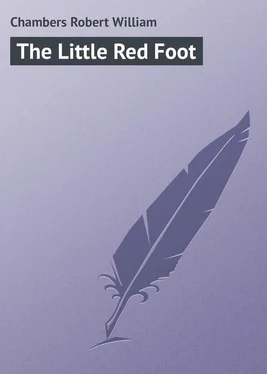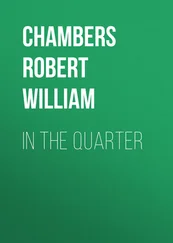Robert Chambers - The Little Red Foot
Здесь есть возможность читать онлайн «Robert Chambers - The Little Red Foot» — ознакомительный отрывок электронной книги совершенно бесплатно, а после прочтения отрывка купить полную версию. В некоторых случаях можно слушать аудио, скачать через торрент в формате fb2 и присутствует краткое содержание. Жанр: foreign_prose, на английском языке. Описание произведения, (предисловие) а так же отзывы посетителей доступны на портале библиотеки ЛибКат.
- Название:The Little Red Foot
- Автор:
- Жанр:
- Год:неизвестен
- ISBN:нет данных
- Рейтинг книги:5 / 5. Голосов: 1
-
Избранное:Добавить в избранное
- Отзывы:
-
Ваша оценка:
- 100
- 1
- 2
- 3
- 4
- 5
The Little Red Foot: краткое содержание, описание и аннотация
Предлагаем к чтению аннотацию, описание, краткое содержание или предисловие (зависит от того, что написал сам автор книги «The Little Red Foot»). Если вы не нашли необходимую информацию о книге — напишите в комментариях, мы постараемся отыскать её.
The Little Red Foot — читать онлайн ознакомительный отрывок
Ниже представлен текст книги, разбитый по страницам. Система сохранения места последней прочитанной страницы, позволяет с удобством читать онлайн бесплатно книгу «The Little Red Foot», без необходимости каждый раз заново искать на чём Вы остановились. Поставьте закладку, и сможете в любой момент перейти на страницу, на которой закончили чтение.
Интервал:
Закладка:
I understood.
"It is you who leave me, Claudia."
She, too, understood. It was my first confession that all was not right betwixt my conscience and my King. For that was the only thing I was certain about concerning her: she never betrayed a confidence, whatever else she did. And so I made plain to her where my heart and honour lay – not with the King's men in this coming struggle – but with my own people.
I think she knew, too, that I had never before confessed as much to any living soul, for she took her other hand from her eyes and looked at me as though something had happened in which she took a sorrowful pride.
Then I kissed her hand for the third time, and let it free. And, going:
"God be with you," she said with a slight smile; "you are my dear friend, John Drogue."
At the Hall porch she turned, the mischief glimmering in her eyes: " – And so is Billy Alexander," quoth she.
So she went into the darkened Hall.
It was many months before I saw our Sacharissa again – not until Major André had made many another verse for many another inamorata, and his soldier-actors had played more than one of his farces in besieged Boston to the loud orchestra of His Excellency's rebel cannon.
CHAPTER III
THE POT BOILS
Sir William died on the 24th of June in the year 1774; which was the twentieth year of my life.
On the day after he was buried in Saint John's Church in Johnstown, which he had built, I left the Hall for Fonda's Bush, which was a wilderness and which lay some nine miles distant in the Mohawk country, along the little river called Kennyetto.
I speak of Fonda's Bush as a wilderness; but it was not entirely so, because already old Henry Stoner, the trapper who wore two gold rings in his ears, had built him a house near the Kennyetto and had taken up his abode there with his stalwart and handsome sons, Nicholas and John, and a little daughter, Barbara.
Besides this family, who were the pioneers in that vast forest where the three patents 2 2 The Three Patents were Sacandaga, Kayaderosseras, and Stones.
met, others now began settling upon the pretty little river in the wilderness, which made a thousand and most amazing windings through the Bush of Major Fonda.
There came, now, to the Kennyetto, the family of one De Silver; also the numerous families of John Homan, and Elias Cady; then the Salisburys, Putnams, Bowmans, and Helmers arrived. And Benjamin De Luysnes followed with Joseph Scott where the Frenchman, De Golyer, had built a house and a mill on the trout brook north of us. There was also a dour Scotchman come thither – a grim and decent man with long, thin shanks under his kilts, who roved the Bush like a weird and presently went away again.
But before he took himself elsewhere he marked some gigantic trees with his axe and tied a rag of tartan to a branch.
And, "Fonda's Bush is no name," quoth he. "Where a McIntyre sets his mark he returns to set his foot. And where he sets foot shall be called Broadalbin, or I am a great liar!"
And he went away, God knows where. But what he said has become true; for when again he set his foot among the dead ashes of Fonda's Bush, it became Broadalbin. And the clans came with him, too; and they peppered the wilderness with their Scottish names, – Perth, Galway, Scotch Bush, Scotch Church, Broadalbin, – but my memory runs too fast, like a young hound giving tongue where the scent grows hotter! – for the quarry is not yet in sight, nor like to be for many a bloody day, alas! —
There was a forest road to the Bush, passable for waggons, and used sometimes by Sir William when he went a-fishing in the Kennyetto.
It was by this road I travelled thither, well-horsed, and had borrowed the farm oxen to carry all my worldly goods.
I had clothing, a clock, some books, bedding of my own, and sufficient pewter.
I had my own rifle, a fowling piece, two pistols, and sufficient ammunition.
And with these, and, as I say, well horsed, I rode out of Johnstown on a June morning, all alone, my heart still heavy with grief for Sir William, and deeply troubled for my country.
For the provinces, now, were slowly kindling, warmed with those pure flames that purge the human soul; and already the fire had caught and was burning fiercely in Massachusetts Bay, where John Hancock fed the flames, daintily, cleverly, with all the circumstance, impudence, and grace of your veritable macaroni who will not let an inferior outdo him in a bow, but who is sometimes insolent to kings.
Well, I was for the forest, now, to wrest from a sunless land a mouthful o' corn to stop the stomach's mutiny.
And if the Northland caught fire some day – well, I was as inflammable as the next man, who will not suffer violation of house or land or honour.
As Brent-Meester to Sir William, my duties took me everywhere. I knew old man Stoner, and Nick had become already my warm friend, though I was now a grown man of more than twenty and he still of boy's age. Yet, in many ways, he seemed more mature than I.
I think Nick Stoner was the most mischievous lad I ever knew – and admired. He sometimes said the same of me, though I was not, I think, by nature, designed for a scapegrace. However, two years in the wilderness will undermine the grace of saint or sinner in some degree. And if, when during those two hard years I went to Johnstown for a breath of civilization – or to Schenectady, or, rarely, to Albany – I frequented a few good taverns, there was little harm done, and nothing malicious.
True, disputes with Tories sometimes led to blows, and mayhap some Albany watchman's Dutch noddle needed vinegar to soothe the flamms drummed upon it by a stout stick or ramrod resembling mine.
True, the humming ale at the Admiral Warren Tavern may sometimes have made my own young noddle hum, and Nick Stoner's, too; but there came no harm of it, unless there be harm in bussing a fresh and rosy wench or two; or singing loudly in the tap-room and timing each catch to the hammering of our empty leather jacks on long hickory tables wet with malt.
But why so sad, brother Broadbrim? Youth is not to be denied. No! And youth that sets its sinews against an iron wilderness to conquer it, – youth that wields its puny axe against giant trees, – youth that pulls with the oxen to uproot enormous stumps so that when the sun is let in there will be a soil to grow corn enough to defy starvation, – youth that toils from sun-up to dark, hewing, burning, sawing, delving, plowing, harrowing day after day, month after month, pausing only to kill the wild meat craved or snatch a fish from some forest fount, – such youth cannot be decently denied, brother Broadbrim!
But if Nick and I were truly as graceless as some stiff-necked folk pretended, always there was laughter in our scrapes, even when hot blood boiled at the Admiral Warren, and Tory and Rebel drummed one another's hides to the outrage of law and order and the mortification of His Majesty's magistrates in County Tryon.
Even in Fonda's Bush the universal fire had begun to smoulder; the names Rebel and Tory were whispered; the families of Philip Helmer and Elias Cady talked very loudly of the King and of Sir John, and how a hempen rope was the fittest cravat for such Boston men as bragged too freely.
But what most of all was in my thoughts, as I swung my axe there in the immemorial twilight of the woods, concerned the Indians of the great Iroquois Confederacy.
What would these savages do when the storm broke? What would happen to this frontier? What would happen to the solitary settlers, to such hamlets as Fonda's Bush, to Johnstown, to Schenectady – nay, to Albany itself?
Sir William was no more. Guy Johnson had become his Majesty's Superintendent for Indian affairs. He was most violently a King's man – a member of the most important family in all the Northland, and master of six separate nations of savages, which formed the Iroquois Confederacy.
Читать дальшеИнтервал:
Закладка:
Похожие книги на «The Little Red Foot»
Представляем Вашему вниманию похожие книги на «The Little Red Foot» списком для выбора. Мы отобрали схожую по названию и смыслу литературу в надежде предоставить читателям больше вариантов отыскать новые, интересные, ещё непрочитанные произведения.
Обсуждение, отзывы о книге «The Little Red Foot» и просто собственные мнения читателей. Оставьте ваши комментарии, напишите, что Вы думаете о произведении, его смысле или главных героях. Укажите что конкретно понравилось, а что нет, и почему Вы так считаете.












